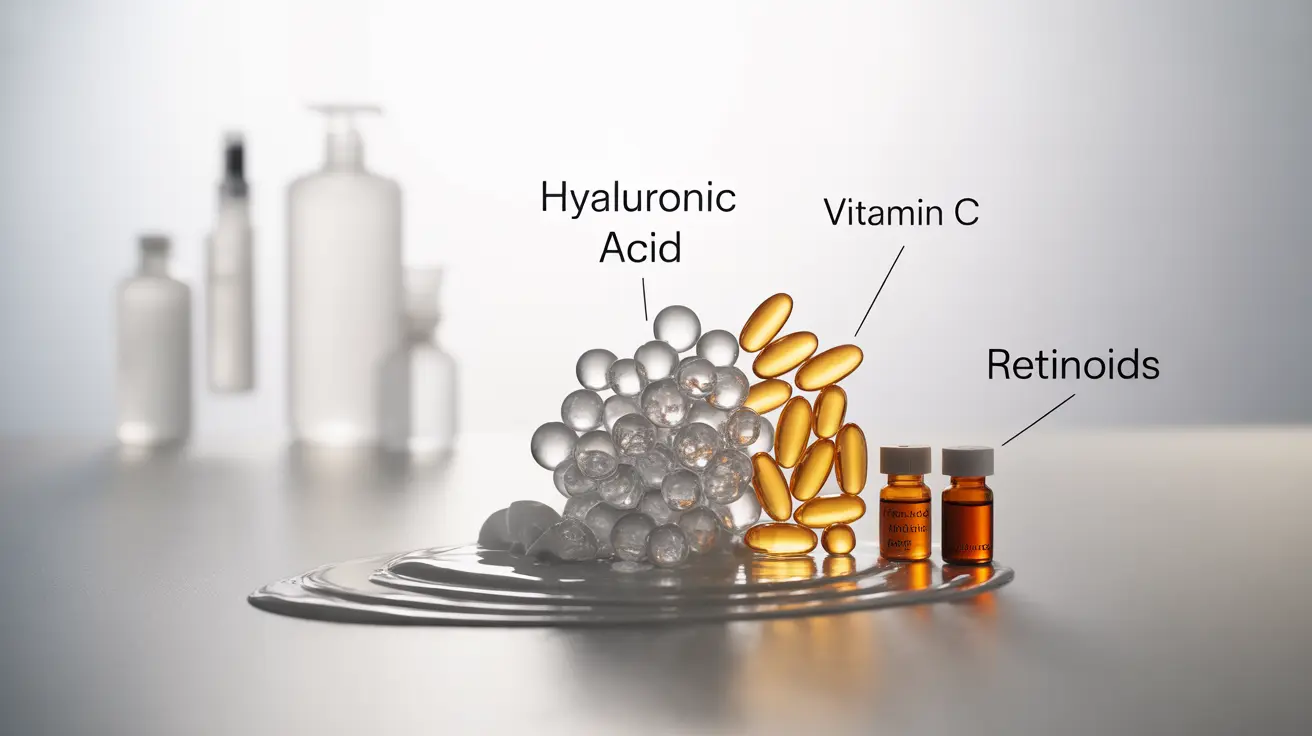Understanding the best ingredients for skin health can feel overwhelming with countless products and buzzwords flooding the beauty market. Whether you're dealing with dry skin, dark spots, or sensitivity, knowing which ingredients truly work can make a significant difference in your skincare routine's effectiveness.
In this comprehensive guide, we'll explore dermatologist-recommended ingredients that are scientifically proven to address various skin concerns, helping you make informed decisions about your skincare routine.
Hydrating Heroes for Dry and Dehydrated Skin
For those battling dry or dehydrated skin, certain ingredients stand out for their exceptional moisturizing properties:
Hyaluronic Acid
This powerful humectant can hold up to 1000 times its weight in water, drawing moisture into the skin and maintaining hydration throughout the day. It works well for all skin types and can be used both morning and night.
Ceramides
These lipid molecules naturally occur in our skin barrier and help retain moisture while protecting against environmental damage. They're particularly effective when combined with other moisturizing ingredients.
Glycerin
A gentle yet effective humectant that helps skin retain moisture and promotes a healthy skin barrier. It's especially beneficial for those with sensitive skin.
Powerful Ingredients for Dark Spots and Hyperpigmentation
Targeting uneven skin tone requires specific active ingredients known for their brightening properties:
Vitamin C
This antioxidant powerhouse not only brightens skin but also provides protection against free radical damage. Look for L-ascorbic acid, the most effective form of vitamin C.
Niacinamide
A form of vitamin B3 that helps reduce inflammation, even out skin tone, and regulate oil production. It's gentle enough for daily use and works well with other active ingredients.
Kojic Acid
Derived from mushrooms, this natural ingredient effectively lightens dark spots and provides antioxidant benefits.
Natural vs. Clinical Ingredients
Both natural and clinically-developed ingredients can play valuable roles in skincare:
Natural Ingredients
- Green tea extract (antioxidant protection)
- Rosehip oil (vitamin C and essential fatty acids)
- Aloe vera (soothing and hydrating)
Clinical Ingredients
- Retinoids (cell turnover and collagen production)
- Peptides (skin firming and repair)
- Alpha-hydroxy acids (exfoliation and renewal)
Ingredients for Sensitive Skin
Those with sensitive skin or conditions like eczema should focus on gentle, soothing ingredients:
Calming Ingredients
- Colloidal oatmeal
- Centella asiatica
- Allantoin
Barrier-Supporting Ingredients
- Squalane
- Panthenol
- Fatty acids
Frequently Asked Questions
- What are the best ingredients for dry or dehydrated skin, and how do they work?
The most effective ingredients for dry skin include hyaluronic acid, ceramides, and glycerin. These ingredients work by attracting and retaining moisture in the skin, while also supporting the skin's natural barrier function. For best results, apply these ingredients to slightly damp skin and seal with an occlusive moisturizer.
- Which dermatologist-recommended ingredients are effective for reducing dark spots and hyperpigmentation?
Dermatologists typically recommend vitamin C, niacinamide, kojic acid, and alpha arbutin for targeting dark spots. These ingredients work by inhibiting melanin production and promoting cell turnover. Consistent use, along with daily sun protection, yields the best results.
- Can I combine hyaluronic acid with retinol, vitamin C, or other active ingredients in my skincare routine?
Yes, hyaluronic acid is a versatile ingredient that pairs well with most active ingredients. It can be particularly beneficial when used alongside potentially irritating ingredients like retinol or vitamin C, as it helps maintain skin hydration and reduce potential irritation.
- Are natural ingredients like green tea extract or plant-based oils as effective as clinically proven ingredients for healthy skin?
While natural ingredients can provide significant benefits, their effectiveness often depends on the specific concern being addressed. Some natural ingredients, like green tea extract, have strong scientific backing for their antioxidant properties. However, for certain skin concerns, clinically proven ingredients may offer more predictable and powerful results.
- How do I choose the right skincare ingredients for sensitive skin or conditions like eczema or psoriasis?
For sensitive skin or specific conditions, focus on gentle, non-irritating ingredients like colloidal oatmeal, ceramides, and panthenol. Avoid common irritants such as fragrance and alcohol. Always patch test new products and introduce one new ingredient at a time. Consider consulting a dermatologist for personalized recommendations, especially for chronic conditions.




